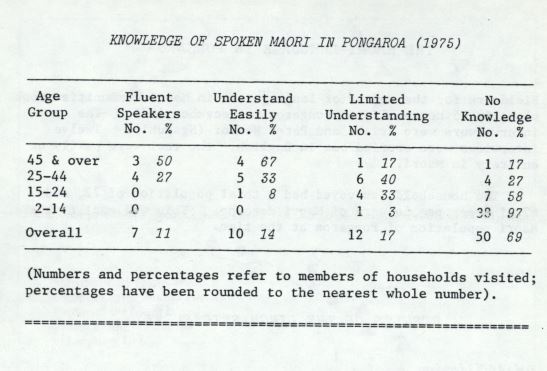-
Ngā Karere me Ngā Rauemi
News and Resources
Ngā Karere me Ngā Rauemi
News and Resources
-
Te Rangaihi Reo Māori
The Movement
Te Rangaihi Reo Māori
The Movement
-
Te Pae Kōrero
Our Community
Te Pae Kōrero
Our Community
-
Huihuinga
Events
Huihuinga
Events
-
Ngā Ara Ako
Learning Pathways
Ngā Ara Ako
Learning Pathways
-
SearchSearch
Search
Search

Many of the people we interviewed were worried that fewer and fewer people knew or used Maori in Pongaroa. It could die out altogether. People felt that Maori had hardly any chance of surviving as a language for everyday purposes in the home and community. This was because active speakers of Maori were over the age of 45, and Maori was used mainly on the marae and in other important meetings. Some people felt whakama about trying to speak Maori among themselves in case they made errors through not using it often enough. Besides, they could express their ideas quicker in English. Most adults in the survey couldn't speak the language well, and therefore couldn't teach it to their children, but they wanted it taught in schools, especially at the primary level. Many people thought this was the only way that the community could keep some small hold on the language of their ancestors, which was rapidly being lost.
Source: Read the full NZCER report here
Manawatū-Whanganui | Tararua | 1970-75 | 5% of Māori children can speak te reo. (1970-75) | Story is by tangata whenua
















Comments